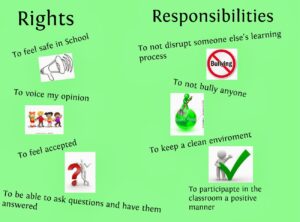Back to: Civic Education JSS1
Welcome to class!
In today’s class, we shall be talking about the types of citizens` rights and obligations. Please enjoy the class!
Types of Citizens` Rights and Obligation
Citizenship involves a dynamic interplay between the rights granted to individuals and the corresponding obligations they bear towards their community. In this class note, we will explore the various types of citizens’ rights and obligations, emphasizing the reciprocal relationship that forms the foundation of a responsible and engaged citizenry.
Understanding Citizens’ Rights

Civil Rights
Civil rights encompass fundamental freedoms such as freedom of speech, religion, and assembly, safeguarding individuals from unwarranted interference in their personal lives.
Political Rights
Political rights include the right to vote, run for public office, and actively participate in democratic processes, ensuring citizens have a say in the governance of their community or nation.
Social and Economic Rights
Social and economic rights involve access to education, healthcare, employment, and other factors that contribute to the well-being and equality of citizens within society.
Exploring Citizens’ Obligations
Civic Duties
Civic duties involve actively participating in democratic processes, obeying laws, paying taxes, and contributing to the betterment of the community through civic engagement.
Social Responsibilities
Social responsibilities include fostering a sense of community, respecting the rights and dignity of others, and actively working towards the common good through volunteerism and cooperation.
Legal Obligations
Legal obligations encompass adherence to the laws of the land, serving on juries if called, and respecting the legal rights of fellow citizens.
The types of citizens’ rights and obligations form the cornerstone of responsible citizenship. As individuals exercise their rights, they concurrently bear obligations to their community, creating a dynamic equilibrium that sustains the principles of democracy, justice, and collective well-being. Understanding and actively participating in this reciprocal relationship is essential for fostering a society built on mutual respect, equality, and civic engagement.
We have come to the end of today’s class. I hope you enjoyed the class!
In case you require further assistance or have any questions, feel free to ask in the comment section below, and trust us to respond as soon as possible. Cheers
Question Time:
- How do civil rights, such as freedom of speech and assembly, contribute to fostering an environment where individuals feel protected from unwarranted interference in their personal lives?
- In democratic societies, what role do political rights, including the right to vote and participate in democratic processes, play in empowering citizens and ensuring their active involvement in governance?
- Can you discuss the impact of social and economic rights, like access to education and healthcare, on the overall well-being and equality of citizens within a society?
